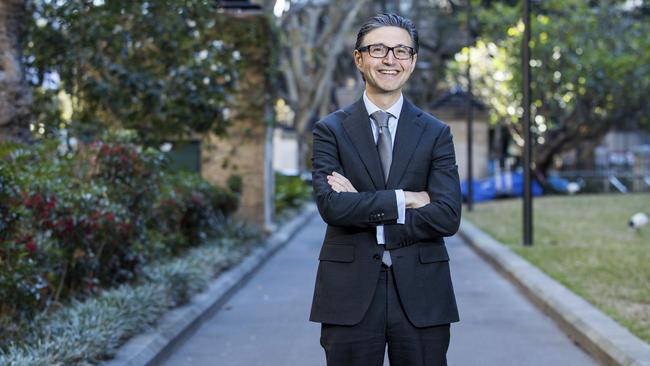Betashares CEO Alex Vynokur tips ballooning growth in ethical and responsible ETF industry by 2030
The Australian ethical and responsible ETF sector is primed to swell five-fold to $50bn by late 2028, even as regulators clamp down on greenwashing.

The Australian ethical and responsible exchange-traded fund sector is primed to swell fivefold to $50bn by late 2028 and may hit $100bn by the decade’s end, underpinned by broader adoption even as regulators clamp down on greenwashing.
That’s the view of Betashares’ chief Alex Vynokur, despite lacklustre one-year returns across many ethically themed exchange-traded funds, given the strong rally in commodity, energy and resource stocks over that period.
He shrugged off those results, saying investors should assess returns over longer time frames and suggesting they were doing so, given healthy inflows into ethical and responsible exchange-traded funds in recent months.
“There’s no doubt the last 12 to 18 months have been volatile for investors,” Mr Vynokur said, noting that through 2022 ethical and responsible ETFs had inflows of $1.8bn, while so far this year $173m has come in.
“The reality is that investors increasingly recognise there is no need to sacrifice their investment objectives over the long term to build a portfolio that aligns with their values.
“While younger investors are perhaps considered the poster child for adoption of ethical and responsible ETFs, we’re now seeing increasing adoption from a broad range of Australian investors, including self-managed super funds.”
As at March 31, the ethical and responsible exchange-traded fund industry amounted to $10.1bn, up from $8.9bn a year earlier and $3.5bn in March 2021. The number of ETFs in this category stands at 56, more than double the 21 two years earlier.
However, Morningstar has found that Australian growth in calendar 2022 in ethical and responsible ETFs was at a slower pace than the prior year.
Separately, the latest quarterly figures indicate investors have cooled on the sustainable managed funds sector. Those sustainable funds, which are actively managed, saw inflows plummet 78 per cent in the first three months this year.
Betashares is a dominant local player in the broader ETF market and accounts for 44.7 per cent of the ethical and responsible ETF industry.
The company’s upbeat view on the space comes against the backdrop of the corporate regulator cracking down on false green claims in the local market, and last month the federal government allocated a further $4.3m in funding to the fight against greenwashing.
Investment firms have not been immune to regulatory action on greenwashing.
In February, the Australian Securities & Investments Commission signalled further legal action was in the pipeline after filing court claims against retirement giant Mercer, claiming it broke greenwashing rules. The regulator in December hit Vanguard Investments Australia with three infringement notices relating to alleged greenwashing.
ASIC last week issued an infringement notice to superannuation fund promoter Future Super Investment Services, relating to alleged greenwashing in a Facebook post.
ASIC deputy chair Sarah Court said the post “overstated the positive environmental impact of the fund”.

Mr Vynokur acknowledged the regulator’s concerns and said the growth in ethical and responsible investing did not come without risk.
“The reality is that some fund managers are seeking to package up existing strategies and slap a responsible label on the tin to attract investors,” he added.
“In this climate, investors should take the time to carefully review the methodology, screening processes, and holdings before putting their money into any fund that claims to be ethical or responsible. Many of these funds say ethical, responsible, or sustainable on the tin but in reality, some simply mirror broad market indices.
“As a result, ethical investors should look for true-to-label ETFs which combine rigorous positive and negative screens. These investors should check whether a fund is certified by an organisation such as the Responsible Investment Association of Australia.”
Mr Vynokur expects growth in the ethical and responsible ETF category will stem from three main sources over the next five to 10 years.
“There is a growing cohort of investors who are seeking to align their portfolio with their values while also meeting their investment objectives,” he said. “Second of all, investors who are seeking to build a responsible portfolio are increasingly attracted to ETFs as the main vehicle to achieve their objectives.
“The cost-effectiveness of ETFs combined with the ability to look under the hood and review the holdings is a significant advantage … Finally, investors are able to build a responsible investment portfolio across a growing range of asset classes as a result of the larger universe of ETFs in the category.”
The volatile climate in financial markets often has industry participants anticipating a shift to stock picking and active funds management, over cheaper passive styles such as ETFs.
Asked about that, Mr Vynokur said: “We hear this same claim every market cycle. Investors are promised outperformance in all market conditions by active managers, but in reality, their performance often falls short of the pitch, particularly on a net of fees basis. An even rarer occurrence are active managers and stockpickers who consistently outperform the benchmark.”
Mooted changes to Your Future, Your Super performance benchmarks and tests, which will include some ethical categories of products, are also prompting debate within the investment community.
Mr Vynokur said there could be “unintended consequences” for ethical investors.
“For example, the application of the performance test will put pressure on the trustees of some funds to reduce the tracking error of their funds relative to the benchmark and create an incentive for less discerning funds to hold securities inconsistent with true-to-label ethical investing,” he added.
“In this climate, while some ethical superannuation funds will buck the trend by staying true-to-label and meeting their benchmarks, others may reduce the quality of their ethical offerings or the depth of their screening.
“It’s our hope the government continues to engage with the sector.” Betashares supports those measures and environmental, social and governance mandatory disclosures but, Mr Vynokur said it was important that disclosures contained “verified information and hard data” to hold companies accountable.
Treasurer Jim Chalmers separately announced a string of measures in April including around the development of consistent clean energy standards and definitions.
Betashares supports those measures and environmental, social and governance mandatory disclosures but, Mr Vynokur said it was important that disclosures contained “verified information and hard data” to hold companies accountable.





